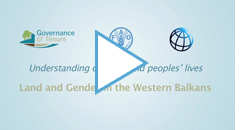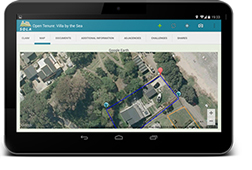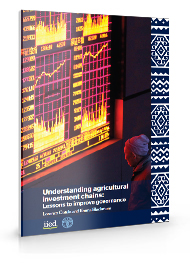Governance of tenure newsletter
1. STORIES FROM THE FIELD: USING THE VOLUNTARY GUIDELINES
New video on women’s right to land
A new video shows that even in countries where clear legal protections for women's ownership of land and property exist, local customs often continue to work against equality for female farmers. The findings illustrate that female property ownership is low throughout the Western Balkans, with rural areas performing particularly poorly.
Gender teams worked together to analyze the data from land registries and to find solutions to challenges to female landownership in their countries. The teams included government policy-makers and technical staff, notaries, surveyors and representatives from civil society organizations.
The video was launched at a UN General Assembly side-event by FAO and the World Bank on 23 September 2014. FAO and the World Bank have been supporting efforts to generate gender-disaggregated reports from land administration systems.
 Understanding customs and peoples’ lives
Understanding customs and peoples’ lives
Land and gender in the Western Balkans
Read more about the project:
Using the Voluntary Guidelines to analyse land laws in the Philippines
 The Voluntary Guidelines were used as a reference in the evaluation of 11 major laws of the Philippines. Areas of complementarity and gaps were identified and the findings could potentially be used as a springboard for advocacy and implementation of the Voluntary Guidelines in the country.
The Voluntary Guidelines were used as a reference in the evaluation of 11 major laws of the Philippines. Areas of complementarity and gaps were identified and the findings could potentially be used as a springboard for advocacy and implementation of the Voluntary Guidelines in the country.
The work was commissioned by the Asian NGO Coalition (ANGOC) as a member of a platform for government agencies, CSOs and development partners working on rural development. The platform is the Philippines Development Forum – Working Group on Sustainable Rural Development. The work was supported by the Deutsche Gesellschaft für Internationale Zusammenarbeit (GiZ).
Record your tenure rights with “Open Tenure”
 Civil society and community groups are invited to test “Open Tenure” by collecting details on tenure rights. Open Tenure is open source software that can operate on low-cost mobile devices or can be accessed through the web from internet cafes.
Civil society and community groups are invited to test “Open Tenure” by collecting details on tenure rights. Open Tenure is open source software that can operate on low-cost mobile devices or can be accessed through the web from internet cafes.
FAO is keen to work with early users of Open Tenure and their feedback will help to improve the software and to identify new functionalities to be added.
Open Tenure can empower communities and individual citizens to identify and document their tenure rights. Trained “community recorders” can use Open Tenure to collect details on tenure rights. The claims to these tenure rights can then be confirmed or corrected through community-based reviews.
The tenure rights can be shown on maps based on publically available map imagery that are stored on the mobile devices. The community can view the confirmed tenure rights through a web application hosted on a cloud-based “Community Server”.
Open Tenure is available on Android mobile devices: download the installation file from www.github.com/OpenTenure/ot-releases An iOS iPad version will be available by the end of the year along with French, Spanish, Arabic, Portuguese and Russian editions.
Unmanned Aerial Systems improve development projects
 Unmanned Aerial Systems (UAS) offer the potential for many countries to improve the quality of their spatial data. UAS technology facilitates the production of faster, better, and cheaper spatial data that can be adopted locally by the public and private sectors for multiple purposes.
Unmanned Aerial Systems (UAS) offer the potential for many countries to improve the quality of their spatial data. UAS technology facilitates the production of faster, better, and cheaper spatial data that can be adopted locally by the public and private sectors for multiple purposes.
An innovation grant of the World Bank (Europe and Central Asia Region) enabled the use of UAS to be tested as a scalable, cost-effective approach to produce spatial data for development projects, including cadastral mapping and 3D modelling for urban planning and taxation. A team from FAO, the World Bank, the private sector, universities, government and municipal authorities tested the technology in several locations in Albania in December 2013. The results and analysis of using UAS are presented in the paper “Drones for Peace”, which can be accessed on the following links:
Read an article based on the project on Unmanned Aerial Systems in Albania
2. PARTNERSHIPS WITH THE VOLUNTARY GUIDELINES
1. Conference on Land Policy in Africa 11-14 November 2014
The Land Policy Initiative (LPI) is organizing its first Conference on Land Policy in Africa, which will take from 11 to 14 November 2014 at the new venue of Addis Ababa, Ethiopia. The objective of the Conference is to deepen capacity for land policy in Africa through improved access to knowledge and information. It provides a forum for presenting research activities and raising awareness of a range of stakeholders on the issues and status of land policy in Africa.
FAO and UNECA, the host of the LPI Secretariat, recently signed a Memorandum of Understanding to support the improvement of the governance of tenure in line with the Voluntary Guidelines and the Framework and Guidelines on Land Policies in Africa.
3. NEWS ON OTHER RELEVANT GUIDELINES
CFS 41 to endorse Principles on Responsible Investments in Agriculture
One approach to improving the governance of tenure in countries is to carry out initial assessments in order to identify gaps and priorities. A tool that is commonly used to make assessments is the Land Governance Assessment Framework (LGAF), which was developed by a consortium of organizations and is led by the World Bank. Assessments using LGAF have been completed or are ongoing in over 50 countries. A methodology has been developed by FAO to determine to what extent and how LGAF can be used to support the implementation of the Voluntary Guidelines. The LGAF results for Georgia, Moldova, the Philippines and Ukraine were used to test the methodology, and the work led to a number of findings and recommendations.
The final draft of the Principles for Responsible Investment in Agriculture and Food Systems will go forward for endorsement by the Committee on World Food Security (CFS) during its 41st Session (13-18 October 2014). The final draft is the result of the negotiations held in May and August 2014.
Principle 5 is on respecting tenure of land, fisheries forests and access to water. The implementation of this principle makes direct reference to the Voluntary Guidelines on tenure and the Voluntary Guidelines for Securing Sustainable Small-Scale Fisheries in the Context of Food Security and Poverty Eradication.
4. TECHNICAL PUBLICATIONS AND E-LEARNING
Understanding agricultural investment chains: Lessons to improve governance
 A new report aims to improve understanding of agricultural investment chains and to promote implementation of the Voluntary Guidelines with regard to agricultural investments. The report, published by FAO and IIED (International Institute for Environment and Development), bases its findings on ten recent large-scale land deals.
A new report aims to improve understanding of agricultural investment chains and to promote implementation of the Voluntary Guidelines with regard to agricultural investments. The report, published by FAO and IIED (International Institute for Environment and Development), bases its findings on ten recent large-scale land deals.
Call for articles in the Land Tenure Journal
The FAO Land Tenure Journal is calling for articles on tenure. We are currently looking for good quality articles exploring new perspectives; bringing in regional experiences and best practices; and proposing ways forward to meet challenges that face people who work on tenure. Should you be interested in contributing an article, please submit it by sending an e-mail to [email protected] by 14 November 2014. The Land Tenure Journal is a peer-reviewed journal.
